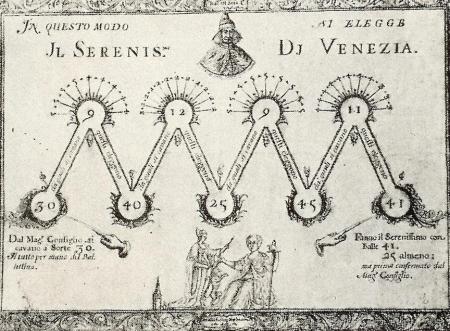Without much commentary, given the high level of knowledge and debate on this blog, I share an important document about elections in Ancient Venice. As most here will know, I hold it that ‘pure’ sortition is a suitable and necessary tool for democracy. However, it is also an insufficient one, as has been criticised already at the time of sortition’s outset, with the powerful “Socratic Objection” as documented by Xenophon. Today, I describe the missing element specifically for appointments to positions of power.
As most here will know, the Ancient Venetians combined sortition with elections in multiple iterations to determine their leadership, the Doge. Their success with this add-on innovation was superior to the Athenians, as evidenced by the significantly longer duration of their system. Now, there clearly were flaws, room for improvement, as their system ended by reversal to today’s unfortunate party system but that’s for another day.
So far, most scientific papers on this topic have been descriptive. Now Miranda Mowbray, and Dieter Gollmann of the Enterprise Systems and Storage Laboratory at
HP Bristol expand the debate with this paper on the mathematical properties of the Venetian method in avoiding usurpation of power while still finding the best leadership. The authors have their mind on applications in distributed computing security, but for us here, the advantages for a more mundane topic such as democracy may be good enough to give it some thought.
Enjoy.
As an aside, the statutes of G!LT in Austria therefore employ the Venetian model for all executive leadership elections. My rationale is that the party system with its unholy alliance with mass media rewards showmanship and superficiality, as evidenced by the high proportion of TV Actors and Reality Show Stars in top jobs. Instead G!LT’s protocol ensures a reasonably self-experienced, direct, personal knowledge of a candidate’s ability and suitability for an executive position. For those who read German, here to the Statutes of G!LT. For those who don’t there is Google Translate.
Filed under: Athens, Deliberation, Elections, History, Sortition, Theory |




“the Ancient Venetians combined sortition with elections in multiple iterations to determine their leadership, the Doge. Their success with this add-on innovation was superior to the Athenians, as evidenced by the significantly longer duration of their system. Now, there clearly were flaws, room for improvement, as their system ended by reversal to today’s unfortunate party system but that’s for another day.”
If longevity is superiority, any regime you establish will be distinctly inferior.
LikeLike
PS: Our standardised variation of the Venetian “SortElection” is in § 11 cif 2 and § 14 cif 1. It will work identically for populations from 2 people to 8 billion i.e. a world government if needed. The calculations for the rounds are as follows:
The “election number” is the number of people representative of the population with a 95% probability within a range of +/- 15%. (For the mathematically minded 95% confidence level, 15% confidence interval.)
The “number of repeats” is the natural logarithm of the total population, divided by the election number rounded down to integer.
LikeLike
INT ( LN ( P/E ) )
LikeLike
In Venice the Correr Museum contains some of the artefacts used in the balloting process (but not much explanation how they were used)
LikeLiked by 1 person
I’ve read the paper and it’s surprisingly lucid. Recommend.
The Venetian system was intended to ensure that no single (oligarchal) family dominated. New families were admitted, but the founding families still dominated somehow.
Prevention of cheating was important too, such as ‘the ball up the sleeve’ trick. Use of a child picked ‘at random’ (actually first one spotted after Mass) helped. Children were also used to draw tickets in the first English National Lottery.
The authors are fulsome in their praise for the stability of the system for over 500 years. They must have been doing something right!
LikeLike